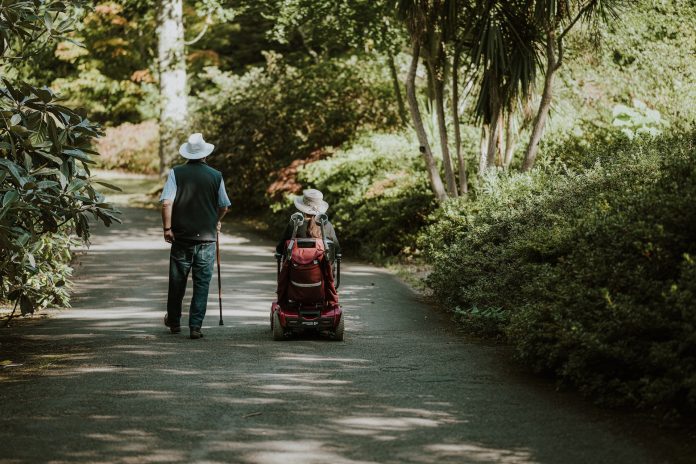
Have you noticed that your partner has begun to have difficulty moving about recently – perhaps struggling to get out of a chair or becoming tired after walking a very short distance? Or perhaps they have developed a medical condition or suffered an injury which makes moving about difficult, and require help to get from one place to another.
If so, they may be experiencing a decline in their mobility, which requires treatment or some kind of mobility aid. They may also require psychological support, to help them manage the negative emotions that can be triggered as a result of being restricted in their movements.
This diminishing of their physical capabilities may come as a bit of a shock to your partner, especially if they have always been active and prided themselves on their fitness. They may begin to struggle with both physical and mental symptoms, ranging from muscle discomfort to fatigue and depression, which may stop them doing activities they have previously always enjoyed.
While adjusting to this loss of mobility may not be easy, you can do several things to help them cope, including both practical and emotional forms of support. Read on to find out more, and help your loved one take the first steps toward regaining their confidence, independence, and quality of life.
Encourage Them To Open Up
There is no denying the fact that the prospect of losing our mobility is a problem that, unsurprisingly, many of us dread, as losing our mobility seems to promise a loss in independence too.
However, the good news is that there are a number of things you can do to support your loved one as they adjust to their body’s new limitations, and talking is one of the simplest but most effective, particularly if they are reluctant to admit to their struggles.
Of course, when it comes to broaching the topic of their decline in mobility, it’s important to be sensitive, and to make gentle suggestions about what may be the best course of action, rather than saying “you must” or “you should”. Coax them to open up about how they are feeling, both physically and mentally, and express your eagerness to support them, whatever form of help they choose to seek.
Book A Doctor’s Appointment
If you have concerns about your partner’s ability to move around safely, then it’s important that you take them to see a doctor so the true extent of their problem can be assessed. Your doctor can carry out various investigations to get a full picture of the issue, and can then recommend the right course of treatment.
It may be that your partner’s mobility problems are caused by something easily remedied, such as an inner ear infection or a particular medication. They may even have a visual problem, such as cataracts, which can cause them to bump into things.
However, if the problem is more serious and likely to be long-term, then the doctor can refer your partner to a specialist or a physiotherapist who can help them strengthen their muscles and improve their balance.
Find The Right Mobility Aid
If you and your partner – not to mention your doctor – have any pressing concerns about their loss of mobility, it may be best to invest in a mobility aid.
The type of aid you try will depend on your partner’s condition and prognosis; for example, they may be able to get about with the aid of a cane or a walking stick.
However, if they want to get out and about but struggle to walk very far, or become easily fatigued, then mobility scooters or powerchairs may be a helpful option. There is a large range to choose from at Mobility Solutions, ranging in size from small to large, and even including folding options for extra convenience and portability.
Keep Moving
It may seem counter-intuitive, but if your loved one is struggling with their mobility then it’s important to keep them exercising. Even a short walk of up to 15 minutes in length can be helpful in preventing a further decline in mobility.
One form of low-impact exercise which has been found to be particularly effective for improving balance and mobility is tai chi. In fact, this Chinese tradition – which has been described as ‘meditation in motion’ – can reduce the risk of falls by up to a fifth.
Other types of exercise that can be beneficial for gently boosting mobility include seated workouts,
Conclusion
While coming to terms with their reduced mobility may be difficult for your partner, particularly at first, your encouragement and support will be of great assistance as they navigate through this tricky time.
With your help, and the medical expertise of their doctor, they will learn new ways to enjoy life and their favourite activities and, with mobility aids on hand, they will never have to miss out on the social outings and events they enjoy. While there may be challenges ahead, it’s important to keep reminding them that a loss of mobility doesn’t have to mean a loss of freedom or quality of life.























